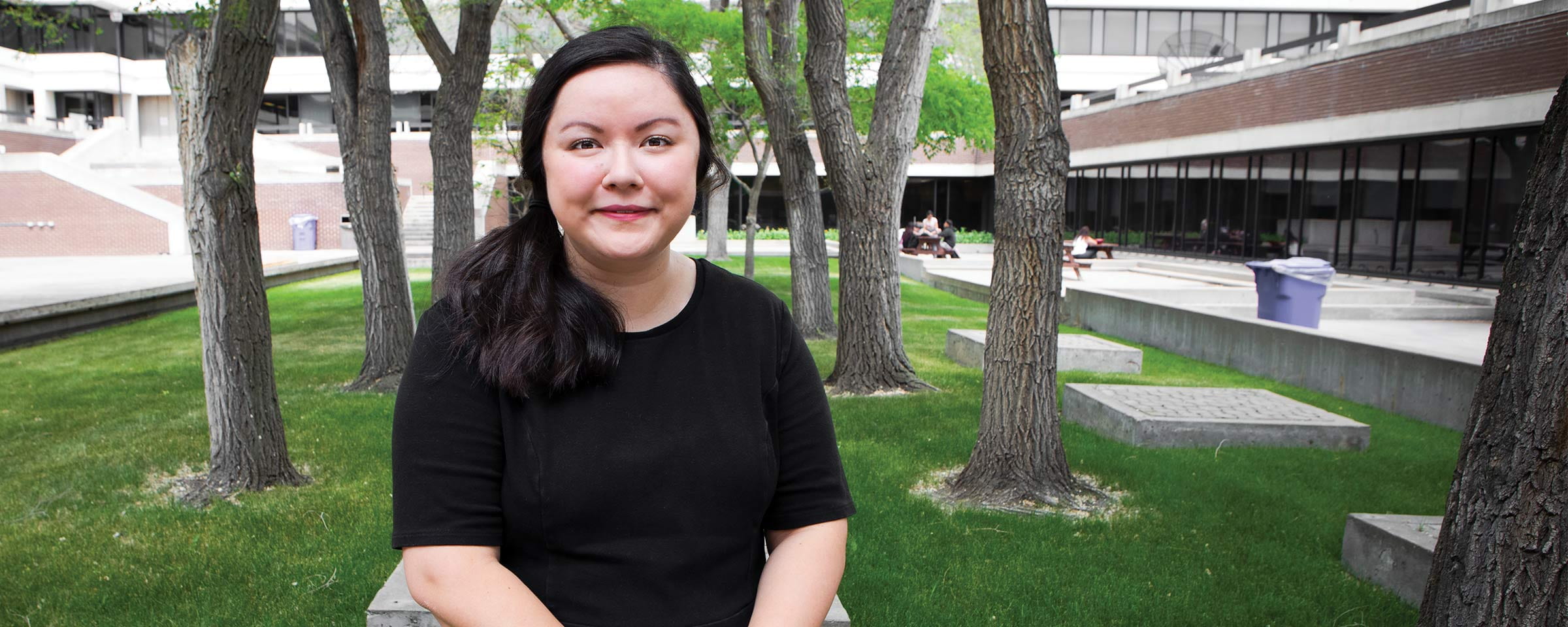War on the mind, heart in the hands
How one Ukrainian student is coping with war in his home country

Distraction can be a good thing.
“There is a famous Ukrainian poet who said, I laughed in order not to cry,” says Vladyslav Terzi. “That explains the whole situation here in Canada.”
Terzi was born in Ukraine and recently reunited with family in Manitoba. His parents and brother moved to Morden in 2016 — Terzi was too old to qualify as a dependent and stayed behind. He finished university, moved to China for three years, then came back to Ukraine. By then it was unsafe.
“It was like you live on a powder barrel,” says Terzi. “You don’t know when it’s going to explode. So, we decided it’s better for me to move to Canada.”
When he arrived in the province, he studied human resources at a different college. The institution didn’t suit him, so after a few months, he moved to RRC Polytech. Terzi says Human Resources in the Business Administration program has been much better, academically and as a distraction.
Terzi likes to keep his mind distracted and focused away from the world around him. “In my case, it’s studying,” said Terzi.
It’s a busy schedule, but Terzi still contacts friends and family back home when he can, sending asynchronous messages like they’re letters.
“I have friends who live in Kharkiv and it’s being attacked every day,” says Terzi. “Sometimes they wake up because of the rockets flying by. I have friends in Mariupol, but it’s hard to get in touch with them because of the problems with internet connections there. I’m worried they will never be the same people they used to be. When you see the place you grew up being demolished in one night, it’s… it changes people.”
Many of Terzi’s friends are at or approaching new stages in life: new careers, in serious relationships, recently married, or with small children. These friends value stability — something they’re unlikely to get any time soon.
“The scariest part is they’re getting used to this life,” he says. “They’re getting used to hearing sirens for air attacks, going somewhere to hide, then when it’s all over, going outside to hope and pray their house is intact.”
Despite the barrage of bad news from Ukraine, Terzi believes the best way he can cope is by focusing on school, staying positive, and doing what he can to help from Canada. He sends any money he doesn’t spend on school back home, choosing not to go out with friends in Winnipeg to save as much as possible. Whenever he has free time, he browses Ukrainian-Manitoban Facebook groups looking for ways to help — there are people asking for rides for new immigrants, help moving in, or even babysitting.
“The Ukrainian community is quite strong in Canada — people help each other all the time,” says Terzi. “It’s just now we have even more reason to take care of each other.”

Even with a support network, ways to keep busy, and a positive outlook, no two people handle a crisis the same way. That’s why RRC Polytech launched an appeal to raise funds for Ukrainian students studying in Manitoba. For people like Terzi, this means Ukrainian students will be able to access additional support from RRC Polytech. The appeal began in March and raised $10,000.
“One thing I love about Canada is that people actually care about each other,” says Terzi. “It’s not just the government saying, we will help Ukrainians, it’s each and every step of the social structure. People do what they can, they understand your situation.”
When he graduates, Terzi says he hopes to get a human resources job in Manitoba, and not just for the career opportunity.
“Right now, the society of Winnipeg and Manitoba is providing things to me,” says Terzi. “And at some point, I want to give it back, any way I can. Even if it’s working in HR and helping people to figure out their problems — as long as it’s helping them, I don’t care.”
—
RRC Polytech has recently launched an additional fund to support international students in distress due to humanitarian crises or war in their home country. We are asking our community to give today to help international students enduring financial hardship. With your gift students who are experiencing war and other humanitarian crises will be helped through additional funding, resources and supports.
Donating is simple, see options below:
Online (please designate your gift to International Student Relief)
By calling: 204-619-0139
By mail:
RRC Polytech Development Office
C306-2055 Notre Dame Ave.
Winnipeg, MB R3H 0J9
—
Spring, by Lesia Ukrainka — graciously translated by Vladyslav Terzi
I stood and listened to spring,
It told me so much — with pain,
She sang me song — loud and ring
And quietly whispered again.
She sang to me about love,
About youth, hopes and joy,
Then she sang me above and above
That’s what my dreams sang to me long time ago.
As a child I sometimes fell,
Hard enough for it to hurt.
Though my heart with pain would swell,
Yet I rose without a word.
They asked me: “Did you hurt yourself?”
“I’m all right”, I would reply.
My pride would then assert itself:
I laughed in order not to cry
But now the drama soon will end;
For me, a bitter cup to sip.
And a clever epigram
Is on the brink of tongue and lip.
But laughter may be merciless:
I fear the blade of open chaff.
And so, surrendering my pride,
I cry in order not to laugh.
Original version:
Стояла я, і слухала весну,
Весна мені багато говорила,
Співала пісню дзвінку, голосну
Та знов таємно-тихо шепотіла.
Вона мені співала про любов,
Про молодощі, радощі, надії,
Вона мені переспівала знов
Те, що давно співали мені мрії.
Упаду, собі на лихо,
Як дитиною бувало,
То хоч в серце біль доходив,
Я собі вставала тихо.
«Що болить?» — мене питали,
Але я не признавалась —
Я була малою горда.
Щоб не плакать, я сміялась.
A тепер, коли для мене
Жартом злим кінчиться драма,
І от-от зірватись має
Гостра злобна епіграма,
Безпощадній зброї сміху
Я боюся піддаватись.
І, забувши давню гордість,
Плачу я, щоб не сміятись.
